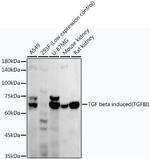Search Thermo Fisher Scientific
FIGURE: 1 / 1
TGFBI Antibody (MA5-51208) in WB

Product Details
MA5-51208
Species Reactivity
Host/Isotype
Expression System
Class
Type
Clone
Immunogen
Conjugate
Form
Concentration
Purification
Storage buffer
Contains
Storage conditions
Shipping conditions
RRID
Product Specific Information
Immunogen sequence: LPPRERSRLL GDAKELANIL KYHIGDEILV SGGIGALVRL KSLQGDKLEV SLKNNVVSVN KEPVAEPDIM ATNGVVHVIT NVLQPPANRP QERGDELADS A
Target Information
This gene encodes an RGD-containing protein that binds to type I, II and IV collagens. The RGD motif is found in many extracellular matrix proteins modulating cell adhesion and serves as a ligand recognition sequence for several integrins. This protein plays a role in cell-collagen interactions and may be involved in endochondrial bone formation in cartilage. The protein is induced by transforming growth factor-beta and acts to inhibit cell adhesion. Mutations in this gene are associated with multiple types of corneal dystrophy.
For Research Use Only. Not for use in diagnostic procedures. Not for resale without express authorization.
References (0)
Bioinformatics
Protein Aliases: Beta ig-h3; beta-ig-h3; betaig-h3; Kerato-epithelin; RGD-CAP; RGD-containing collagen-associated protein; transforming growth factor beta-induced 68kDa; transforming growth factor, beta induced, 68 kDa; transforming growth factor, beta-induced, 68kD; transforming growth factor, beta-induced, 68kDa; Transforming growth factor-beta-induced protein ig-h3
Gene Aliases: 68kDa; AI181842; AI747162; Beta-ig; Big-h3; BIGH3; CDB1; CDG2; CDGG1; CSD; CSD1; CSD2; CSD3; EBMD; LCD1; TGFBI
UniProt ID: (Human) Q15582, (Mouse) P82198
Entrez Gene ID: (Human) 7045, (Mouse) 21810, (Rat) 116487

Performance Guarantee
If an Invitrogen™ antibody doesn't perform as described on our website or datasheet,we'll replace the product at no cost to you, or provide you with a credit for a future purchase.*
Learn more
We're here to help
Get expert recommendations for common problems or connect directly with an on staff expert for technical assistance related to applications, equipment and general product use.
Contact tech support
